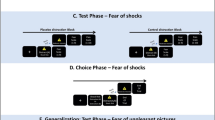Abstract
This study investigated the effects of self-monitoring (SM) as a function of expectancy factors and incompatible response training. The monitored response was fingernail biting. Twenty college students who were nail biters were randomly assigned to the following groups: (I) SM alone; (II) SM plus an expectancy that improvement would result from using that procedure; (III) SM plus positive expectancy and incompatible response training; and (IV) a waiting list control. The results showed that the reactivity of SM was determined by the expectancy variable. SM alone did not reduce nail biting, nor did the addition of an incompatible response increase the reactivity of SM. The implications of these results are discussed.
Similar content being viewed by others
References
AZRIN, N., & NUNN, R. 1973. Habit reversal: A method of eliminating nervous habits and tics. Behavior Research and Therapy, 11, 619–628.
BELLACK, A., ROZENSKY, R., & SCHWARTZ, J. 1974. A comparison of two forms of self-monitoring in a behavioral weight reduction program. Behavior Therapy, 5, 523–530.
BORKOVEC, T. 1972. Effects of expectancy on the outcome of systematic desensitization and implosive treatments for analogue anxiety. Behavior Therapy, 3, 29–40.
DANIELS, L. 1974. Rapid extinction of nailbiting by covert sensitization: A case study. Journal of Behavior Therapy and Experimental Psychiatry, 5, 91–92.
JEFFREY, D. 1974. Self-control: Methodological issues and research trends. In M. Mahoney & C. Thoresen (Eds.), Self-control: power to the person. Belmont, Calif.: Brooks-Cole.
KAZDIN, A. 1974. Self-monitoring and behavior change. In M. Mahoney & C. Thoresen (Eds.), Self-control: power to the person. Belmont, Calif.: Brooks-Cole.
KIRK, R. 1968. Experimental design: procedures for the behavioral sciences. Belmont, Calif.: Brooks-Cole.
MacNAMARA, J. 1972. The use of self-monitoring techniques to treat nailbiting. Behavior Research and Therapy, 10, 193–194.
MAHONEY, M. 1974. Cognition and behavior modification. Cambridge, Mass.: Ballinger Co.
MALETZKY, B. 1974. Behavior recording as treatment: A brief note. Behavior Therapy, 5, 107–111.
NELSON, R., LIPINSKI, D., & BLACK, J. 1975. The effects of expectancy on the reactivity of self-recording. Behavior Therapy, 6, 337–349.
OLIVEAU, D., AGRAS, S., LEITENBERG, H., MOORE, R., & WRIGHT, D. 1969. Systematic desensitization, therapeutically oriented instructions, and selective positive reinforcement. Behavior Research and Therapy, 7, 27–33.
ROSS, J. 1974. The use of contingency contracting in controlling adult nailbiting. Journal of Behavior Therapy and Experimental Psychiatry, 5, 105–106.
THORESEN, C., & MAHONEY, M. 1974. Behavioral self-control. New York: Holt, Rinehart & Winston.
VARGAS, J., & ADESSO, V. 1976. A comparison of aversion therapies for nailbiting behavior. Behavior Therapy, 7, 322–329.
WEBB, E., CAMPBELL, D., SCHWARTZ, R., & SECHREST, L. 1966. Unobtrusive measures: nonreactive research in social sciences. Chicago: Rand McNally.
ZIMMERMAN, J., & LEVITT, E. 1975. Why not give your client a counter: A survey of what happened when we did. Behavior Research and Therapy, 13, 333–337.
Author information
Authors and Affiliations
Rights and permissions
About this article
Cite this article
Katz, R.C., Thomas, S.L. & Williamson, P. Effects of Self-Monitoring as a Function of its Expected Benefits and Incompatible Response Training. Psychol Rec 26, 533–540 (1976). https://doi.org/10.1007/BF03394421
Published:
Issue Date:
DOI: https://doi.org/10.1007/BF03394421



